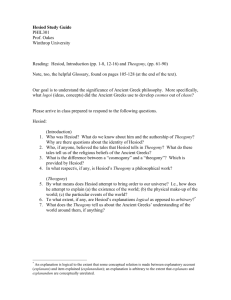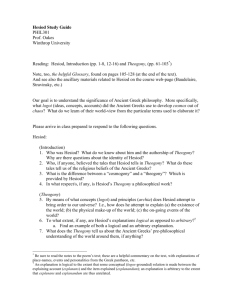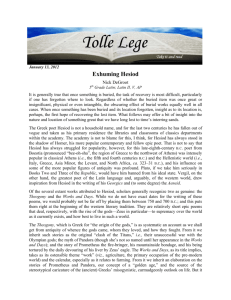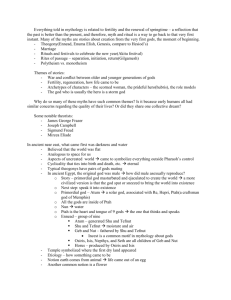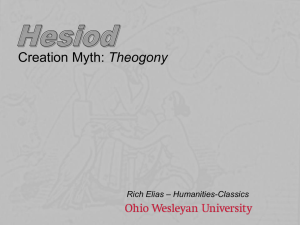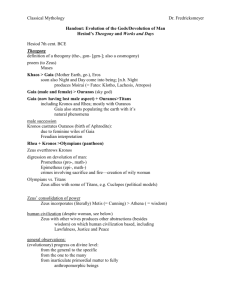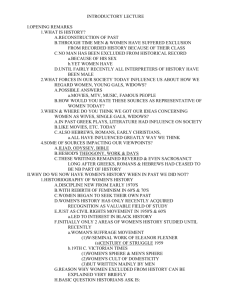INTRODUCTION TO HESIOD
advertisement
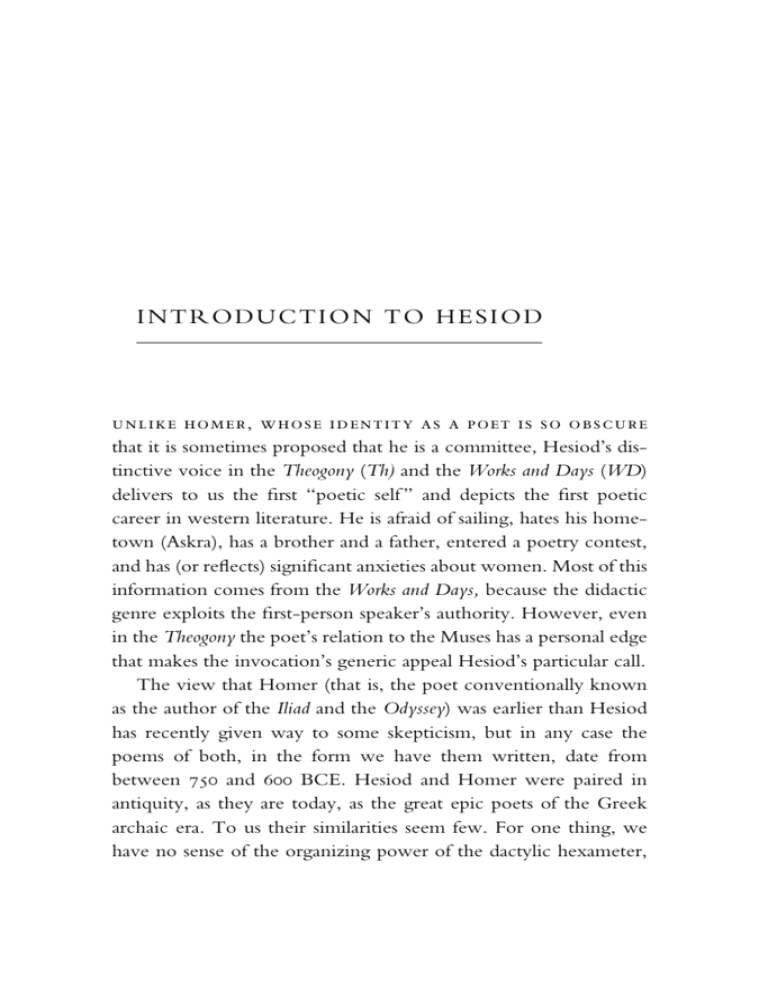
INTRODUCTION TO HESIOD unlike homer, whose identity as a poet is so obscure that it is sometimes proposed that he is a committee, Hesiod’s distinctive voice in the Theogony (Th) and the Works and Days (WD) delivers to us the ‹rst “poetic self ” and depicts the ‹rst poetic career in western literature. He is afraid of sailing, hates his hometown (Askra), has a brother and a father, entered a poetry contest, and has (or re›ects) signi‹cant anxieties about women. Most of this information comes from the Works and Days, because the didactic genre exploits the ‹rst-person speaker’s authority. However, even in the Theogony the poet’s relation to the Muses has a personal edge that makes the invocation’s generic appeal Hesiod’s particular call. The view that Homer (that is, the poet conventionally known as the author of the Iliad and the Odyssey) was earlier than Hesiod has recently given way to some skepticism, but in any case the poems of both, in the form we have them written, date from between 750 and 600 BCE. Hesiod and Homer were paired in antiquity, as they are today, as the great epic poets of the Greek archaic era. To us their similarities seem few. For one thing, we have no sense of the organizing power of the dactylic hexameter, the meter in which Hesiod’s and Homer’s poems are composed and whose sound de‹ned epic, nor of the Ionian dialect that was the characteristic speech of archaic Greek epic. To modern students “epic” as a genre suggests something big, usually historic, sometimes overblown; epic can ‹t the grand scope of Homer, but not Hesiod’s comparative brevity (one book of the Iliad can be as long as the whole Works and Days, and the Theogony only exceeds it by two hundred lines). The heroic epic gave Milton the genre for Paradise Lost, the subject matter of which matched or exceeded the scope and weight of Homer’s material, and gave it a length to echo Vergil’s epic the Aeneid, a poem that itself consciously recalls Homer. Films such as Lawrence of Arabia or Star Wars claim the genre of epic for being concerned with heroes, history, the cosmos and its exploration, and the human values established and revealed by the stories they develop. But in archaic Greek poetry, epic contains, in addition to its heroic songs, short poems about the gods (such as the Homeric Hymns, or the song in the Odyssey that Demodocus sings to the Phaeacians about Ares and Aphrodite), systematic narratives such as the Theogony, and didactic poems such as the Works and Days. Hesiod probably made use of writing in composing his poems, but his poems belong to the preliterate poetic tradition in which, for uncountable centuries before, poems were composed orally by singers and relied on the sound of the singing for their meaning; we are here a long way from the solitary, silent reader of modern poetry. Singers called rhapsodes traveled throughout the Greek world (mainland Greece, the islands, the coasts of Asia minor, and what is now Turkey), singing at festivals and special banquets (such as that in Phaeacia in the Odyssey book 8) and constituting an important and integral part of civilized life. We know from Hesiod (Works and Days 654–59) that he entered a contest and won the prize at a festival, where singers would have recited (or sung, accompanied by a lyre) poems that included portions of the saga of INTRODUCTION TO HESIOD 2 the Trojan war as well as poems such as Hesiod’s own. Obviously such entertainment teaches and gives pleasure to its audience; as the rhapsode tells the tales of the gods and the heroic past he teaches the values and history of the Greeks, to the Greeks; the pleasure of song is the rare commodity that we mortals may share with the gods. We can share that pleasure because the source of poetry is divine. The Muses, daughters of Zeus who delight their father with song, give the poet the ability to sing to mortals—and, in the process, give us what little portion of lasting fame we have. The poet must invoke the Muses so that they will teach him to sing and help him as he sings. In his long invocation at the beginning of the Theogony, Hesiod reports that the Muses “breathed a god-inspired voice in me, / That I might celebrate the things that were and that shall be.” Homer never speaks in the ‹rst person, except to invoke the Muse for her help at the beginning of a song or in the special circumstance of remembering long lists and catalogues; but Hesiod’s ‹rst-person pronoun, his poetic self, participates in the invocation of the Muses in the Theogony and even names him: “The Muses once to Hesiod taught lovely song indeed, / While he was tending to his sheep on holy Helicon.” The singers of orally composed poetry sang songs that had been conceived, perfected, and re-perfected by singers over generations, and they undoubtedly altered these received poems according to the occasion of the performances and their own talents. But the song is not the singer’s own, and the idea of a god who gives the performer the song is certainly as plausible as the idea of a god who gives you lightning bolts or justice or in‹nite mercy. Add to the unknown source of your song the peculiar psychology of poetic inspiration—unpredictable, frustrating, and uncanny even in the most secular of circumstances—and the idea that a divinity is responsible for the myriad elements of this art seems inescapable. However, if authorship (and even the idea of authorship is a new thing in a context where Introduction to Hesiod 3 previously performance, not invention, must have been the focus) can be located in a particular singer’s skill, inspired by the Muse, and, though composed within the conventions of oral poetry, veri‹ably a product special to this singer, the relationship of the singer to his song will be different than it was formerly, as we see that it is in Hesiod. The sense that Hesiod has an identity comes from statements he makes that are attributable to the poet’s persona—the biographical notes about his family, for instance. But it also comes from his distinct point of view as it shapes his telling of clearly conventional material, though his point of view is obviously controlled by the program of each poem. We learn more about Hesiod from the Works and Days than from the Theogony because the Works and Days is a didactic poem: the authoritative and explicitly avowed ‹rst-person speaker is a convention of the didactic style where a speaker directs his thoughts and injunctions to a second-person addressee—in the Works and Days to Hesiod’s brother Perses. More broadly, where the Theogony is an account of the creation of a stable cosmos, the generations of the gods, and the reconciliation of divine family violence under the rule of Zeus, the Works and Days locates human life in that ordered cosmos and tells how to live justly under the rule of Zeus. The two poems’ differences in their accounts of the creation of the ‹rst woman illustrate their different orientations. In the Theogony the creation of the ‹rst woman is incidental to the quarrel between Zeus and Prometheus. The poem, one notes, tells a creation story that does not include the creation of humans but only of women; that men have existed alongside the gods until the time of the gift of ‹re is, remarkably, only revealed with the comment that at Mekone the gods and men were making some formal division among themselves (Theogony 535) when Prometheus devises his scheme to trick Zeus. That trick describes the etiology of sacri‹ce: Prometheus misleads Zeus—and the text is resolutely INTRODUCTION TO HESIOD 4 ambiguous about how fully Zeus was deceived—so that he takes the portion of the ox that is only bones but covered with the luscious-looking fat. In this model, when we mortals share a meal with the gods it will only be in the ritual meal of sacri‹ce; our portion will be the bloody, meaty parts—we will eat our mortality, in the phrase of J.-P. Vernant—while the sweet-smelling smoke rises up to nourish the gods. In anger at Prometheus for the fat-andbones trick, Zeus keeps ‹re from humans, but Prometheus, a version of the trickster archetype, sneaks ‹re to mortals anyway and thus prompts Zeus’s retaliatory creation of the ‹rst woman. This ‹rst woman has no name; Zeus orders her manufacture (“The lovely evil he had made to countervail the good” [Theogony 585]), Hephaistos makes her from clay, and Athena dresses her. She and her miraculous adornment are called “marvels,” or marvelous to see, wonders that impress both gods and men. She is also a devouring, consuming woe to men; yet without her there are no children. Heterosexual reproduction is the price humans pay, at the hand of Zeus, for the civilizing force of ‹re; woman is the baleful counterweight to Prometheus’s technological gift. The narrative then reverts to the con›ict between Prometheus and Zeus, and to Zeus’s conquest and his inescapable rage—but it is Prometheus who can’t escape him; the men whose lives are altered entirely for the worse by the introduction of a woman into the previously all male world are, again, incidental to the larger purposes of this narrative. In the Works and Days the ‹rst woman has a name, and she is part of the explanation of why men’s lives are hard, why we must work, and why we need to be just; she is part of the program to explain the lives of humans in the cosmos under the rule of Zeus. The quarrel that occupied some ‹fty lines of narrative in the Theogony—the retaliatory exchanges of force (Zeus) and tricks (Prometheus)—is summarized in eight lines in the Works and Days; the malice of Zeus is greater, and he laughs aloud at the idea of the Introduction to Hesiod 5 recompense for ‹re that he devises, before she is even made (Works and Days 59). While the woman is a marvel in the Theogony, the Works and Days devotes much more intimate detail to her making, appearance, and nature, why she is a threat to men, and how she is installed through Prometheus’s unknowing human brother, Epimetheus, the man of afterthought. Her name is Pandora, which means “All-Gifted,” both because all the gods give her gifts and because she has all gifts: And the gods’ herald gave her a voice, by the thunderer’s design, And called this woman the All-Gifted one, Pandora, because the divine Olympians all gave her a gift and as a gift did give Her as a woe to mortal men, who must earn their bread to live. (Works and Days 79–82) Aphrodite gives her “painful longing”; that is, Hesiod has the goddess put the male response to women inside the woman. Moreover, Pandora opens a jar (not a box, as conventional parlance would have it), a pithos, the ubiquitous ancient container that holds lifesustaining substances such as olive oil and grain and is rounded in the middle, shaped like a pregnant woman’s body. Like Pandora, the pithos is made of clay. Ills go ›ying out of the jar—all the suffering that men had never known before the coming of women. But hope stays inside, beneath the rim of the jar. Hope is the unborn child inside a woman’s belly, but whose child will it be? Implicit is the male’s fear about the outcome of his desire for this beautiful maiden. The woman is a woe, an endless uncertainty, and her body embodies male desire. Hesiod is sometimes cited as the prime and earliest example, the locus classicus, of ancient Greek misogyny. But it is worth noting that the reasons for the fear at the base of this misogyny are abundantly clear, and that Hesiod’s animus against women is easy to deconstruct. In the Theogony the woman stays inside the house INTRODUCTION TO HESIOD 6 consuming goods, depleting the man; while men work all day, like bees, women, like drones, “stay within the sheltered hives and gather / Into their stomachs all the work expended by another” (Theogony 598–99). In the Works and Days the inside of the woman herself holds the mystery of the child, the ambiguous hope inside the jar: that hope is ambiguous because if the woman has not stayed inside his house the child may not be his. The Theogony demonstrates Zeus’s construction of a patriarchy to block the cyclic episodes of birth, violence, and usurpation that manifest themselves in the ‹rst two divine generations. The very ‹rst generation needs no father, no male, and the earth, Gaia, gives birth on her own. In the last generation of gods Athena needs no mother, and Zeus’s violence takes away female power over her own reproduction. The human order is located within the divine one: the power that women potentially hold is articulated clearly in both poems, and the concomitant male fear is reasonable in the circumstances of property inheritance as it is set up in a patriarchy. Hesiod’s is, if one were choosing, a misogyny preferable to later literary forms of the phenomenon, that of the Roman elegiac poet, for instance, whose suave control of the female is so seamless that he enjoys depicting her rebellions. Hesiod reveals the causes and nature of his fear, and how the fear engenders mistrust and hatred; we thus recognize the defensive posture underlying the aggressive maneuvers and recognize that this is standard, lamentable human behavior, even when divine. Women aside, property rights are still dif‹cult. The didactic pose Hesiod strikes in the Works and Days rests upon a con›ict between himself and his brother Perses over their inheritance from their father, and the conceit of the poem is that he directs his speech to his brother. Hesiod can thus invest the didactic poet’s position of authority with personal emotion and can then broaden his scope from personal feeling to a general view of justice that delineates the human condition, explaining why we need justice Introduction to Hesiod 7 and what are the rules of just living, down to our days and hours and weeks. Most of all, we see the dif‹culty of making a living off the unforgiving Greek soil. Hesiod’s invocation to the Muses in this poem is worth comparing with his extraordinarily long invocation at the start of the Theogony, where some of his anxiety about women seems extended to the Muses, who use their human singers with ungenerous will, not revealing for certain whether or not they tell the truth. “You shepherds of the wilderness, mere bellies, poor excuse / For men,” he has his Muses say to him: “we can make falsities and fallacies seem true, / But when we want we’re able to give truthful statements too” (Theogony 24–28). The Muses are the only source of crucial gifts to humans; one of these is straight justice and fair speech by way of Zeus (Theogony 80–93)— what is so important in the con›ict with Perses in the Works and Days—and the other is forgetfulness of anguish, the solace that hearing a singer brings to humans who suffer (Theogony 97–103). But while in the Theogony the singer’s problem is being unable to know, being outside, in the Works and Days Hesiod invokes the Muses with no taint of mistrust. His invocation (and here it is only ten lines) opens with a triple speech-act: he calls upon the Muses, asking them to speak of Zeus; he enjoins the god to hear him; and he claims to Perses that he will speak only the truth. He makes a claim for justice and a claim for truth. In this human world that needs the unambiguous Muse and the help of Zeus, Hesiod’s distinction between the two kinds of Strife opens the exposition of the brothers’ quarrel. Hesiod’s description of Perses’s greedy behavior, and that of others like him, culminates in one of his most vexed lines, “Fools, they don’t know how much more the half is than the whole” (Works and Days 40). This is a moment that registers Hesiod’s bleak recognition of human limitation: we are not gods and thus cannot have the whole; the half is our inevitable portion—and yet with Justice we can live with this, live without bad Strife, and have the better path. It is clear that INTRODUCTION TO HESIOD 8 many of Hesiod’s sources for the didactic Works and Days belong to a much older tradition of wisdom literature, yet this verse is so typical of the poet in the Works and Days, who takes pains to reveal himself, that we have a window here into how the individual poet in the archaic period interacts with conventional material. “How much more the half is than the whole” has an aphoristic ring that is nevertheless Hesiod’s own. The identi‹cation in this century of Near Eastern texts— Mesopotamian, Egyptian, Sumerian, Hittite, and Semitic—that are clear sources for Hesiod’s poetry also shows the eastward turn of the archaic Greek world, toward trade routes that are easier than westward ones, and toward older, more sophisticated civilizations than that of the Greeks. The story in the Theogony of the succession of the gods is a version of a far older Hittite tale, found in the Babylonian Enuma Elish. The wisdom literature of the Egyptians and Phoenicians is plainly evident in the Works and Days, and readers less learned in arcane literature will recognize echoes of Proverbs, Leviticus, or Genesis. Hesiod’s in›uence over ancient poetry was immense. His importance even to Plato is obvious from how frequently this writer of prose, who was of course deeply skeptical about poetry, quotes him. One of the most famous examples is Plato’s Myth of the Metals in Book 3 of The Republic, where Hesiod’s genetic myth of the different ages of men, from gold to iron, is transformed to an ontological myth (Plato’s “noble lie”) about the different kinds of men. Six or seven hundred years after Hesiod, in a profoundly different world, the Roman poets Vergil and Lucretius both wrote didactic poems that look back to Hesiod. The poems as we have them are clearly not quite the ones Hesiod left. The evidence is good that neither the Theogony nor the Works and Days ended as they do now. The last hundred lines or so of the Theogony are certainly not by the same Hesiod who wrote the ‹rst nine hundred, and the Works and Days as we have it was, Introduction to Hesiod 9 in the ancient world, followed by a discussion of bird omens. The endings of poems from antiquity are especially vulnerable to additions and substitutions. But in this translation we have treated the poems as the entities that their texts present today, and such is the supple, insistent grace of these poems, so closely do they still adhere to the Muses’ inspiration, that Hesiod’s voice seems as clear and compelling as it ever was. Our hope is to convey some of Hesiod’s wonder. I owe particular thanks in this project to Rebecca Resinski, whose careful reading of Hesiod exceeds any critic’s I know for its clarity, truth, and generosity; her wisdom has informed a great deal of my own thinking about this most human yet magical poet. Most classicists dream of translating their favorite poems into English, but most of us have skills rather more on the philological than the poetical side. I feel profound gratitude to Henry Wein‹eld for this collaboration, which, begun rather cavalierly and certainly by chance, has given me the opportunity to participate in changing Hesiod’s astounding poems into what strikes me as equally astounding English. Henry Wein‹eld’s alchemical gifts as a poet and thinker are responsible for an outcome to this collaboration that ful‹lls every hope I have had for bringing Hesiod’s poems to modern ears. INTRODUCTION TO HESIOD 10
